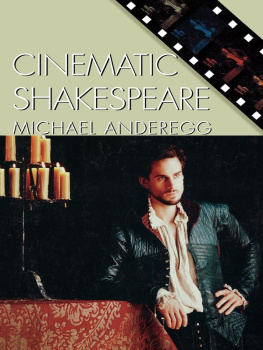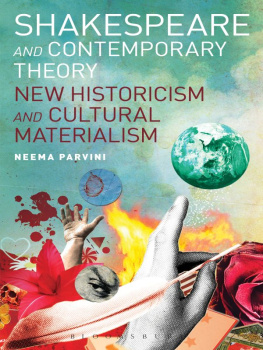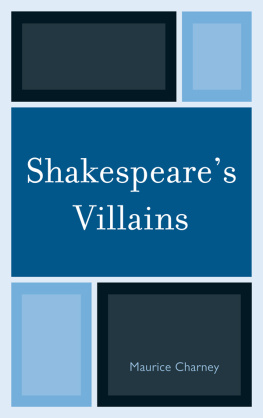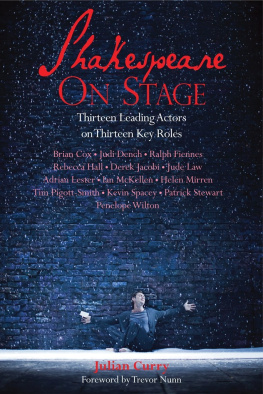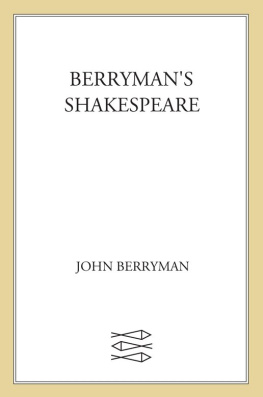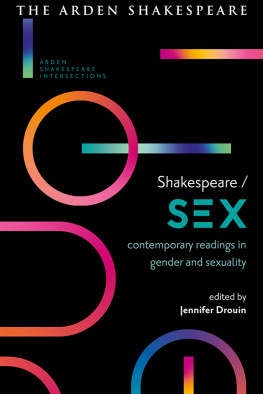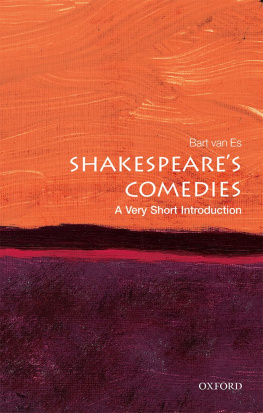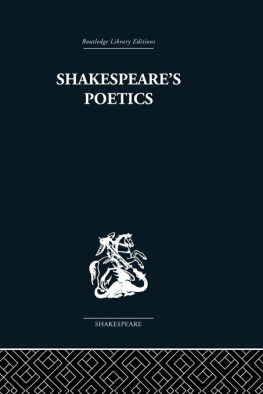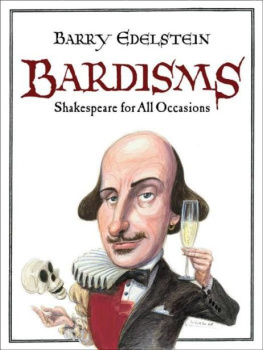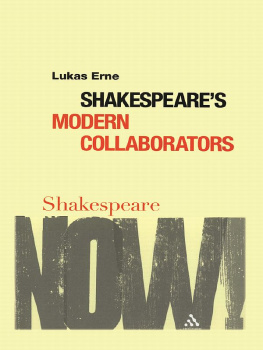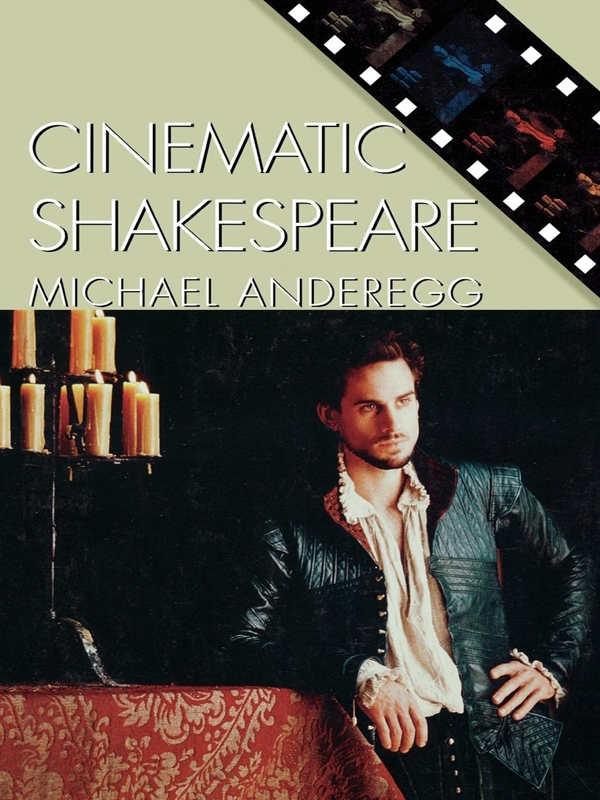Michael Anderegg is professor of English and film studies at the University of North Dakota. He is the editor of Inventing Vietnam (1991) and author of William Wyler (1979), David Lean (1982), and, most recently, Orson Welles, Shakespeare, and Popular Culture (1999).
Bibliography
Affron, Charles, and Mirella Jona Affron. Sets in Motion: Art Direction and Narrative Film. New Brunswick, N.J.: Rutgers University Press, 1995.
Almereyda, Michael. William Shakespeares Hamlet. Introduction by Ethan Hawke. London: Faber & Faber, 2000.
Anderegg, Michael. Orson Welles, Shakespeare, and Popular Culture. New York: Columbia University Press, 1999.
Andrew, Dudley. Film in the Aura of Art. Princeton: Princeton University Press, 1984.
Ball, Robert Hamilton. Shakespeare on Silent Film . London: George Allen & Unwin, 1968.
Banham, Martin. BBC Televisions Dull Shakespeares. Critical Quarterly 22, no. 1 (1980): 31-40.
Barnouw, Erik. The Magician and the Cinema . New York: Oxford University Press, 1981.
Bate, Jonathan, ed. Titus Andronicus. London: Routledge, 1995.
Bazin, Andr. What Is Cinema? Vol. 1., edited and translated by Hugh Gray. Berkeley: University of California Press, 1967.
Belsey, Catherine. Shakespeare and Film: A Question of Perspective. Literature/Film Quarterdy 11, no. 3 (1983): 152-58.
Boose, Lynda E., and Richard Burt, eds. Shakespeare, The Movie: Popularizing the Plays on Film, TV, and Video. London: Routledge, 1997.
Branagh, Kenneth. Beginning. New York: St. Martins, 1989.
. Hamlet : Screenplay, Introduction, and Film Diary. New York: Norton, 1996.
. Henry V: The Screenplay. New York: Norton, 1997.
. Mttch Ado about Nothing: The Making of the Movie. New York: Norton, 1993.
Braudy, Leo. The WorLd in a Frame: What We See in Films. Garden City, N.Y.: Anchor, 1977.
Brecht, Bertolt. The Messingkauf Dialogues. Translated by John Willett. London: Methuen, 1965.
Breight, Curtis. Branagh and the Prince, or a Royal Fellowship of Death. Critical Quarterly 33, no. 4 (1991): 95-111.
Brode, Douglas. Shakespeare in the Movies. New York: Oxford University Press, 2000.
Brooke, Nicholas, ed. The Tragedy of Macbeth. Oxford: Oxford University Press, 1990.
Brown, Constance A. Oliviers Richard III: A Reevaluation. Film Quarterly, Summer 1967, 23-32.
Browne, Nick, ed. Refiguring American Film Genres. Berkeley: University of California Press, 1998.
Buchanan, Judith. Virgin and Ape, Venetian and Infidel: Labellings of Otherness in Oliver Parkers Othello. In Shakespeare, Film, Fin de Sicle, edited by Mark Thornton Burnett and Ramona Wray, 179-202. New York: St. Martins, 2000.
Buchman, Lorne M. Still in Movement: Shakespeare on Screen. New York: Oxford University Press, 1991.
Buhler, Stephen. Shakespeare in the Cinema: Ocular Proof. Albany: State University of New York Press, 2002.
Bulman, James C. The BBC Shakespeare and the House Style. Shakespeare Quarterly 35 (1984): 571-81.
Bulman, James C., and H. R. Coursen, eds. Shakespeare on Television. Hanover, N.H.: University Press of New England, 1988.
Burnett, Mark Thornton, To Hear and See the Matter: Communicating Technology in Michael Almereydas Hamlet (2000). Cinema Journal, Spring 2003, 48-69.
Burnett, Mark Thornton, and Ramona Wray, eds. Shakespeare, Film, Fin de Sicle. New York: St. Martins, 2000.
Burt, Richard. Shakespeare and the Holocaust: Julie Taymors Titus Is Beautiful, or Shakesploi Meets (the) Camp. In Shakespeare after Mass Media, edited by Richard Burt, 295-329. New York: Palgrave, 2002.
. Shakespeare in Love and the End of the Shakespearean: Academic and Mass Culture Constructions of Literary Authorship. In Shakespeare, Film, Fin de Sicle, edited by Mark Thornton Burnett and Ramona Wray, 203-31. New York: St. Martins, 2000.
. To E- or Not to E-: Disposing of Schlockspeare in the Age of Digital Media. In Shakespeare after Mass Media, edited by Richard Burt, 1-32 . New York: Palgrave, 2002.
Burt, Richard, ed. Shakespeare after Mass Media. New York: Palgrave, 2002.
. Unspeakable ShaXXXspeares: Queer Theory and American Kiddie Culture. New York: St. Martins, 1998.
Cartmell, Deborah. Interpreting Shakespeare on Screen. New York: St. Martins, 2000.
Cavecchi, Mariacristina. Peter Greenaways Prosperos Books: A Tempest between Word and Image. Literature/Film Quarterly 25, no. 2 (1997): 83-89.
Chamey, Maurice, and Gordon Hichens. On Mankiewiczs Julius Caesar. Literary Review 22 (1979): 433-59.
Colley, Scott. Richards Himself Again: A Stage History of Richard III. New York: Greenwood, 1992.
Collick, John. Shakespeare, Cinema, and Society. Manchester: Manchester University Press, 1989.
Collier, Susanne. Post-Falklands, Post-Colonial: Contextualizing Branagh as Henry V on Stage and on Film. Essays in Theatre 10, no. 2 (1992): 143-54.
Coursen, H. R. Branaghs Two Hour Hamlet: A Review Essay. Shakespeare Bulletin, Summer 2000, 39-40.
Cox, John, ed. Shakespeare in Production: Much Ado about Nothing. Cambridge: Cambridge University Press, 1997.
Crowl, Samuel. Changing Colors Like the Chameleon: Ian McKellens Richard III from Stage to Screen. Post Script, Fall 1997, 53-63.
. The Marriage of Shakespeare and Hollywood: Kenneth Branaghs Much Ado about Nothing. In Spectacular Shakespeare: Critical Theory and Popular Cinema, edited by Courtney Lehmann and Lisa S. Starks, 110-24. Madison, N.J.: Fairleigh Dickinson University Press, 2002.
. A Midsummer Nights Dream. Shakespeare Bulletin, Summer 1999, 41-42.
. Our Lofty Scene: Teaching Modern Film Versions of Julius Caesar. In Teaching Shakespeare into the Twenty-first Century, edited by Ronald E. Salomone and James E. Davis, 222-31. Athens: Ohio University Press, 1997.
. A World Elsewhere: The Roman Plays on Film and Television. In Shakespeare and the Moving Image: The Plays on Film and Television, edited by Anthony Davies and Stanley Wells, 146-62. Cambridge: Cambridge University Press, 1994.
Cubitt, Sean. Timeshift: On Video Culture. London: Routledge, 1991.
Davies, Anthony. The Film Versions of Romeo and Juliet. Shakespeare Survey 49 (1996): 153-62.
. Filming Shakespeares Plays. Cambridge: Cambridge University Press, 1988.
Davies, Anthony, and Stanley Wells, eds. Shakespeare and the Moving Image. Cambridge: Cambridge University Press, 1994.
Dawson, Anthony. Shakespeare in Performance: Hamlet. Manchester: Manchester University Press, 1995.
Dawtrey, Adam, and Monica Roman. Love Triangle Times 3. Variety, March 23, 1999. Shakespeare in Love clipping file, Margaret Herrick Library.
Deats, Sara Munson. Rabbits and Ducks: Olivier, Branagh, and Henry V. Literature/Film Quarterly 20 (1992): 284-93.
De Grazia, Margreta, and Stanley Wells, eds. The Cambridge Companion to Shakespeare. Cambridge: Cambridge University Press, 2001.
Demaray, John G. Shakespeare and the Spectacles of Strangeness: The Tempest and the Transformations of Renaissance Theatrical Forms. Pittsburgh: Duquesne University Press, 1998.
Dent, Alan. Text-editing Shakespeare. In Hamlet: The Film and the Play, edited by Alan Dent. London: World Film Publications, 1948.
Dessen, Alan. Shakespeare in Performance: Titus Andronicus. Manchester: Manchester University Press, 1989.
Donaldson, Peter. Digital Archives and Sibylline Fragments: The Tempest and the End of Books. Postmodern Culture 8, no. 2 (1998). http://jefferson.village.virginia.edu/pmc/issue.198/8.2miles.html .
. Shakespearean Films/Shakespearean Directors. Boston: Unwin Hyman, 1990.

